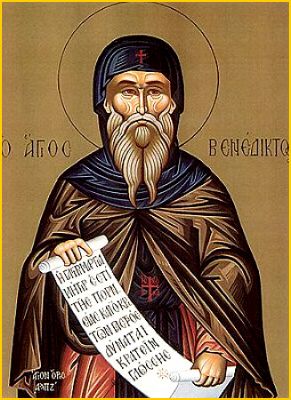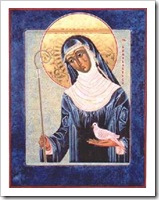|
|||
|---|---|---|---|
| This weekly bulletin insert complements the curriculum published by the Department of Christian Education of the Orthodox Church in America. This and many other Christian Education resources are available at http://dce.oca.org. | |||

The Church celebrates Saint Benedict of Nursia, a small town near Rome. He is known as the father of Western and especially Benedictine monasticism. Benedict was anything but a scholar. He mistrusted schooling and academic pursuits, fearing they might undermine his spiritual efforts. His time in Roman schools confirmed his opinion: they had low standards, and the city itself was a mess of corruption and vice. He fled to a church, where he lived for a while before abandoning city crowds forever to make a solitary life in a desert cave. Like many monastics who did not intend to attract followers, Benedict found that other men wanted to emulate his way of life and joined him. As the years progressed he founded several monasteries, basing his monastic rules on those of Saint Basil the Great and Saint John Cassian. The most famous of Benedict's monasteries was near the top of Monte Cassino, a mountain south of Rome. At the base of the mountain was another monastery. This one was for women, and one of its members was Benedict's twin sister, Scholastica. Though we don't know all the details of their lives, the tradition is that Scholastica lived with other religious women near her father's home, and when he died she moved closer to Benedict. The writings of Saint Gregory Dialogos (known to us for compiling the prayers of the Presanctified Liturgy) give us a story about the brother and sister that shows they could irritate each other, as siblings will. One late evening, the story says, Benedict was preparing to return to his monastery after a pleasant meal and a day of spiritual conversation with his sister. She had enjoyed the visit so much that she suggested he stay till morning, so that they could talk long into the night about heavenly things. He replied sternly that he couldn't be away from his monastic cell for a whole night. A strange thing happened then. Scholastica put her head down on the table and began to pray with tears. Suddenly the dark sky, which had been clear, was filled with pounding rain, lightning and thunder, making it impossible for Benedict to get back to his cell.
He was far from pleased, and scolded his sister, "Why have you done this?" She answered, "I asked you, and you would not listen to me. So I asked my Lord, and He has listened." Saint Gregory Dialogos comments that Scholastica, wanting so much to have more of Benedict's company, proved more powerful than her brother because she loved more. Whatever Benedict's irritation that night, he was filled with loving sorrow when his sister died some time later. He immediately had her body brought to his monastery and buried her in a tomb he had intended for himself. Saint Gregory writes, "And so it happened that even the tomb could not separate the bodies of these two who were always of one mind in God." |
|||

